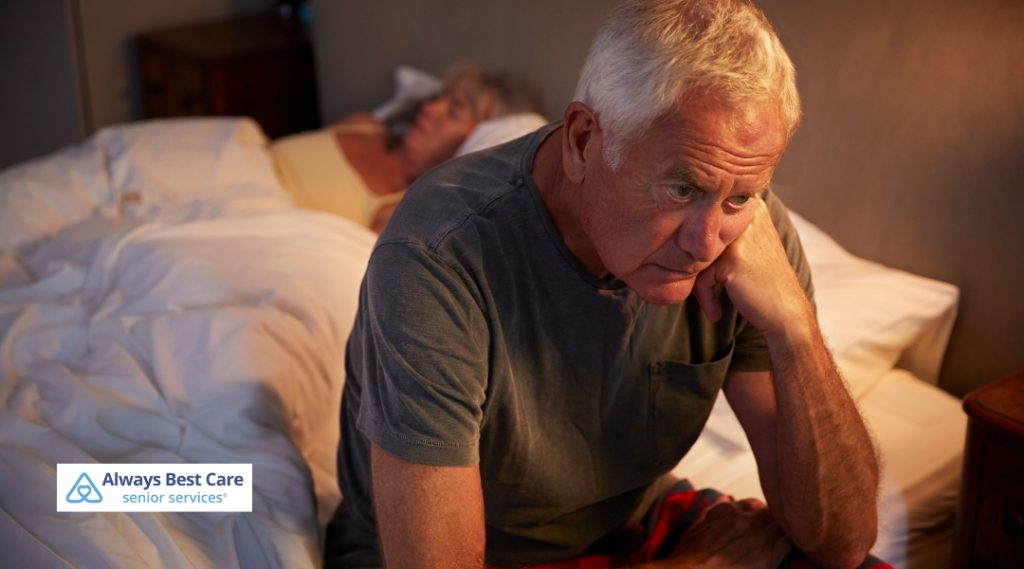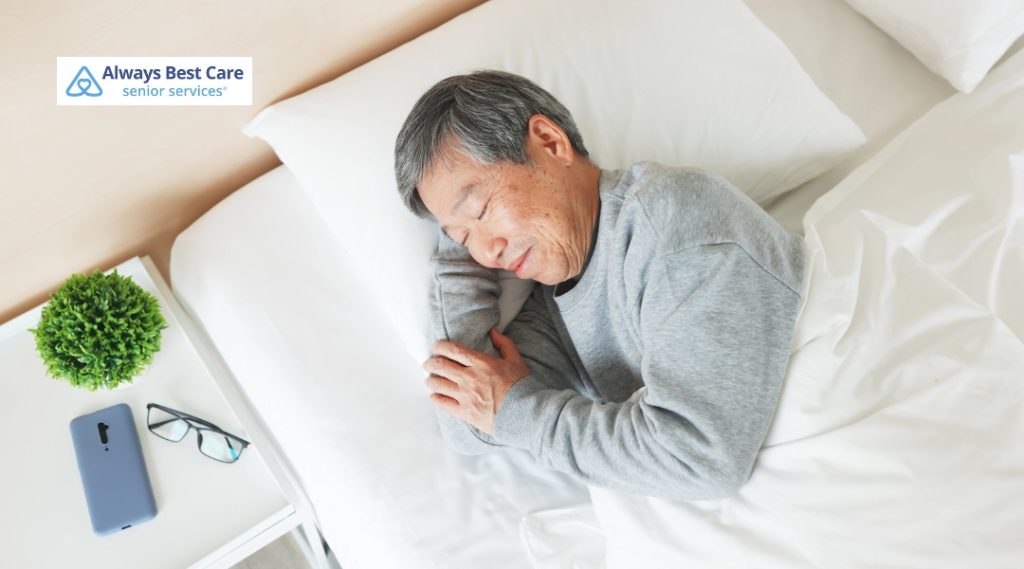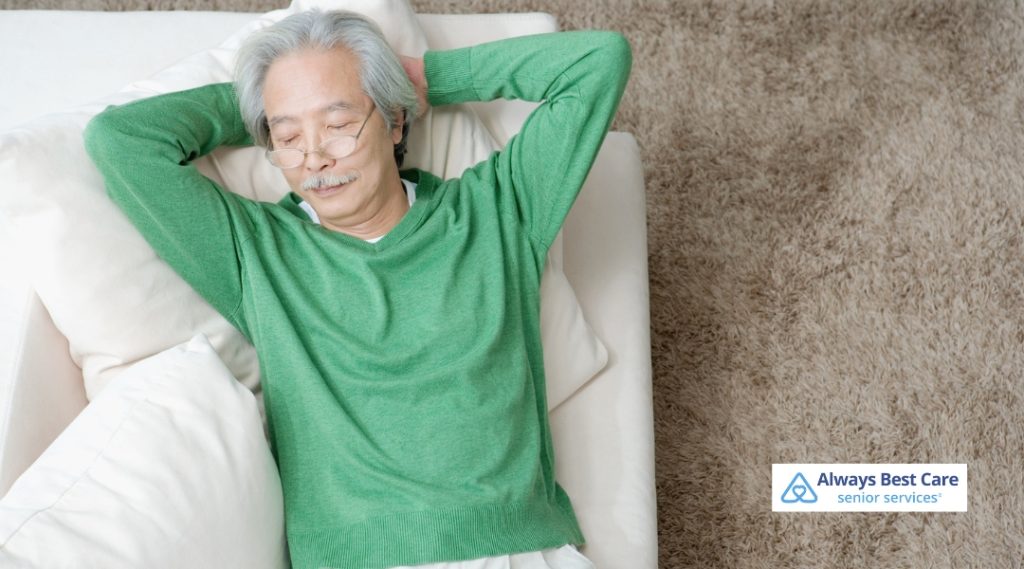Finding Peaceful Sleep: Combating Insomnia for Seniors in Chapel Hill, NC

If you’re a senior in Chapel Hill, NC, battling insomnia, you’re definitely not alone.
Sleep issues among seniors are incredibly common, and insomnia can be a frustrating roadblock to feeling rested and refreshed.
The bad news is that insomnia often becomes more prevalent with age.
The good news? There are plenty of natural ways to combat sleepless nights without relying on medication.
Let’s take a closer look at how seniors in Chapel Hill can improve their sleep quality and wake up feeling ready to take on the day!
Table of Contents
Why Do Old People Sleep So Much?
As we age, our sleep patterns change. Many seniors sleep more during the day, which can raise questions about the need for more rest. But why is this?
As we age, our circadian rhythm—the body’s internal clock—shifts, often making us feel sleepy earlier in the evening.
Seniors also tend to have lighter, more fragmented sleep, often leading to napping during the day to compensate for nighttime wakefulness.

4 Common Causes of Insomnia in Seniors
- Health Conditions: Conditions like arthritis, diabetes, heart disease, and chronic pain can make it harder to get a good night’s rest. If you’re dealing with discomfort or pain, it’s no surprise that sleep can be elusive.
- Medications: Some medications prescribed to seniors may interfere with sleep. Blood pressure meds, painkillers, and antidepressants are a few examples of drugs that can disrupt sleep patterns.
- Aging: As we age, our bodies naturally go through changes. Seniors tend to experience lighter sleep and may wake up more frequently throughout the night. These natural shifts in sleep patterns can make it harder to get deep, uninterrupted rest.
- Lifestyle Factors: Poor sleep hygiene, excessive caffeine, and irregular sleep schedules are all factors that can affect sleep. Seniors who keep irregular sleep patterns or who consume stimulants like caffeine and alcohol too close to bedtime may struggle to fall asleep.
The Physical and Emotional Impact of Insomnia on Seniors
Insomnia doesn’t just leave you feeling groggy—it has a far-reaching impact on both your physical and mental health. For seniors, lack of sleep can lead to:
- Physical Health Problems: When you don’t get enough sleep, your immune system becomes weaker, making it easier to fall ill. Chronic insomnia has also been linked to higher risks of heart disease, high blood pressure, and diabetes.
- Cognitive Decline: Sleep is crucial for cognitive function. Seniors suffering from insomnia may experience memory problems, reduced concentration, and difficulty processing information.
- Mood Changes: Constantly feeling tired can lead to irritability, mood swings, and even depression. Sleep deprivation can affect your emotional well-being and make it harder to enjoy the things that matter.

Creating a Sleep-Friendly Environment in Chapel Hill, NC
Sometimes, a simple change in your surroundings can help you sleep better. Making your bedroom a peaceful haven can go a long way in improving sleep quality. Here’s how to make your environment more sleep-friendly:
- Keep It Cool and Comfortable: A cool room, usually around 60-67°F, is ideal for sleeping. Make sure your room is comfortable with the right pillows and mattresses to support your sleep posture.
- Reduce Noise and Light: A quiet, dark room is essential for a restful night’s sleep. Consider blackout curtains to block out early morning light, or use earplugs or a white noise machine to drown out background noise.
- Declutter Your Space: A tidy bedroom is a peaceful bedroom. Keep your sleeping area organized to reduce stress and create a calm atmosphere.
Lifestyle Changes to Combat Insomnia Naturally
If you’re serious about improving your sleep, making changes to your daily routine can make a big difference. Here are some simple, natural ways to promote better sleep:
- Stick to a Regular Sleep Schedule: Going to bed and waking up at the same time every day helps regulate your internal clock. Even on weekends, try to stick to your sleep schedule to maintain consistency.
- Exercise During the Day: Physical activity during the day can promote deeper sleep at night. Just be sure to avoid vigorous exercise too close to bedtime, as that can have the opposite effect.
- Limit Naps: While napping can feel great, long naps during the day can interfere with your ability to sleep at night. If you need to nap, keep it short—about 20 minutes is ideal.
- Avoid Stimulants Before Bed: Cut back on caffeine, nicotine, and alcohol, especially in the evening. These substances can interfere with your ability to fall asleep and stay asleep.

The Role of Diet in Sleep Quality for Seniors
What you eat plays a big part in how well you sleep. Seniors in Chapel Hill, NC, should pay attention to their diet to improve sleep quality. Certain foods can help promote relaxation and encourage sleep, while others can do the opposite.
- Sleep-Promoting Foods: Try eating foods that are rich in magnesium or tryptophan, such as bananas, turkey, and almonds. These foods can help boost serotonin levels, promoting relaxation and a deeper sleep.
- Foods to Avoid: Heavy meals, spicy foods, or anything that causes indigestion can make it hard to sleep. Avoid these foods close to bedtime. Also, steer clear of caffeine and alcohol in the hours leading up to bedtime.
FAQs
1. How can seniors improve sleep naturally?
Create a calming bedtime routine, stick to a sleep schedule, avoid stimulants, and make your sleep environment as comfortable as possible. Relaxation techniques like deep breathing and meditation can also help.
2. How much sleep do seniors need?
Most seniors need about 7-8 hours of sleep per night. However, it’s important to focus on sleep quality rather than quantity.
3. Why do seniors nap during the day?
As we age, we tend to experience lighter, more fragmented sleep at night. Daytime naps help compensate for lost sleep, but limiting naps can improve nighttime rest.

Finding Peaceful Sleep in Chapel Hill, NC
If you or a loved one is struggling with insomnia and needs extra support, we are here to help. Contact Always Best Care of Chapel Hill at (336) 948-9152 to schedule a care consultation and learn how our in-home care services can improve your quality of life. A restful night’s sleep is just a call away.





